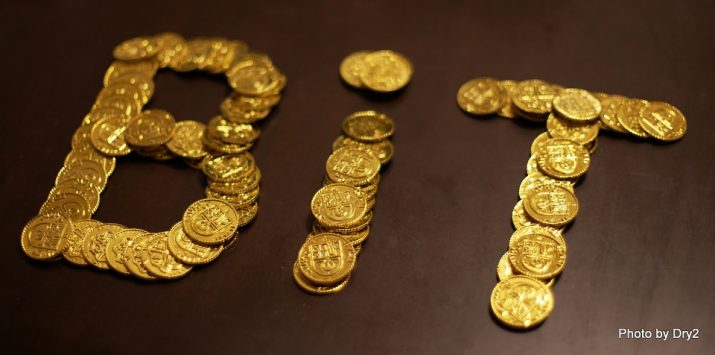
PANIC: $300M in cryptocurrency VANISHES overnight… user error blamed… 10 reasons why gold is better than Bitcoin
Wednesday, November 08, 2017 by Mike Adams
http://www.marketcrash.news/2017-11-08-cryptocurrency-vanishes-user-error-10-reasons-gold-better-than-bitcoin.htmlv

Bitcoin’s meteoric rise in price has been accompanied by a predictably parallel rise in the contorted lunacy we seem to witness in every irrational bubble, no matter what its origin. The Bitcoin bubble delusion has become so convincing to some people that they now believe Bitcoin is the “new gold” or “better than gold.” And yet Bitcoin, like every other cryptocurrency, is nothing more than a virtual shared spreadsheet (ledger) that’s subject to all the failings of software, cyber warfare and even power grid failures.
Just yesterday, in fact, The Guardian reported on how $300M in Ether currency just vanished due to an accident committed by just one user. “More than $300m of cryptocurrency has been lost after a series of bugs in a popular digital wallet service led one curious developer to accidentally take control of and then lock up the funds, according to reports,” reports The Guardian. Yes, you read that correctly: A user accidentally destroyed $300 million worth of cryptocurrency. Oops.
The news publisher goes on to explain:
Effectively, a user accidentally stole hundreds of wallets simultaneously, and then set them on fire in a panic while trying to give them back.
In effect, this morning as Ether users woke up and checked their online wallets that they foolishly believed contained “real money,” they actually discovered that all their cryptocurrency coins had vanished. Now, the Ethereum community is desperately trying to convince 51% of its users to agree to a “back track” maneuver to reverse the catastrophic mistake, only proving yet again that cryptocurrency coins utterly contradict any legitimate definition of a “store of value” since they can be created or destroyed at any time merely by groups of users voting them into existence (or reversing blockchain transactions they don’t like). In other words, the blockchain is run by a committee of self-interested dip##its who break their own rules all the time, abandoning any real claim that cryptocurrencies are “based on the laws of mathematics.” Hogwash.
Obviously, if one gold owner makes a mistake and does something wrong with his gold, it does not cause a huge number of other gold owners to lose their gold. Yet this is exactly what can happen — and just did happen — with cryptocurrencies.
People who claim Bitcoin is better than gold are incredibly deluded
Despite the fact that gold is a fundamental element of the cosmos and can’t be destroyed with a software error, there are really people running around the internet claiming Bitcoin is “better than gold.” They point to the fact that Bitcoin is incredibly portable (which is true) and easy to transfer to other parties without lugging around physical coins (also true when there’s a functioning power grid and internet infrastructure), yet nearly same advantages can be attributed to a checking account. I don’t hear anyone arguing that a checking account is “better than gold.”
Another myth about Bitcoin is that all transactions are anonymous. This is absurd and stupid, given that the entire history of every Bitcoin transaction is replicated in the public blockchain, meaning that every Bitcoin transaction is easily tracked. (If you want real anonymity, use Zcash, which is a vastly superior cryptocurrency.)
For those who still aren’t convinced that Bitcoin doesn’t compare to gold as a store of wealth, here’s a short list of the almost self-evident reasons why Bitcoin will never measure up to the reliability and trust of gold.
#1) Gold has been around for over 13 billion years and is a fundamental element of the cosmos. Bitcoin has existed fewer than 13 years and hasn’t even come close to standing the test of time.
If you think an abstract, experimental construct that has only existed for a few years — that’s Bitcoin — is a better store of value than a cosmic element which has existed for 13 billion years, you don’t understand the definition of “store of value.” Or maybe you just don’t understand the Table of Elements. (Try to destroy Iron, Copper, Nitrogen or Carbon and see how far you get…)
#2) Unlike Bitcoin, gold cannot be created or destroyed by human beings.
Despite the best efforts of all the alchemists in the history of the world, nobody has yet figured out a way to make gold. (That’s because it’s an element, not a compound.) Similarly, you can’t destroy gold in anything less than a nuclear explosion or an exploding star. Bitcoin, on the other hand, is created via software and can be destroyed in an instant. The ability of humans to artificially create and destroy Bitcoin means by definition that it is not a reliable store of value.
#3) When the power grid goes down, gold is still gold. But Bitcoin becomes worthless.
Ask any citizen of Puerto Rico about the value of Bitcoin following a hurricane-induced power outage, and you’ll come to discover that Bitcoin’s value is exactly zero when there’s no electricity. Yet, amazingly, gold is still gold. It doesn’t vanish into thin air when the power disappears. In fact, gold becomes even more valuable when other forms of electronic money fail and collapse. Gold had value long before electricity, computers and cryptography, as a matter of fact, and gold will still have value long after modern human civilization crashes and burns.
#4) Physical gold cannot be stolen through the internet
Gold is a physical material. No one can steal your gold through the internet. Bitcoin has been repeatedly stolen through online wallets, computer hacks and the theft of wallets. Sure, someone can attempt to steal your physical gold at gunpoint, but they can also steal your Bitcoin in exactly the same way. Thus, Bitcoin has all the theft risks of gold, plus the additional theft risks of cyber space on top of that. (In other words, there are far more ways to steal Bitcoin than to steal gold.)
#5) The value of any single Bitcoin depends on the entire Bitcoin infrastructure continuing to operate
The value of your Bitcoin is wholly dependent on the entire Bitcoin infrastructure continuing to function, which encompasses transaction confirmation computers running 24/7 and processing blockchain transactions. This infrastructure now requires more electricity than an entire nation of 186 million people. If that infrastructure goes down, Bitcoin becomes worthless because it cannot be used for transactions. Yet gold is impervious to such failures and does not require a massive global network of computers to maintain its value. Gold can be transacted using no technology at all. (“I’ll trade you this gold coin for that truck.”)
#6) When you try to burn gold, you just get melted gold. When you burn Bitcoin wallets, you lose all your Bitcoins.
You can destroy paper by burning it, turning it into mostly carbon. You can destroy plastic by burning it, too. You can even destroy an automobile by setting it on fire. But guess what happens when you try to burn gold? You just get melted gold. That’s because you can’t “burn” gold and turn it into something that isn’t gold. Like silver, copper and platinum, gold is an element of the cosmos. The laws of physics tell you that gold is a far better store of value than Bitcoin, since gold is always gold. (But Bitcoin is a complex logical abstraction that depends on a multitude of logic layers and electrical infrastructure to continue to function.)
#7) Owning gold is truly anonymous. Your gold cannot be detected, and if you move it around, nobody else knows.
The entire Bitcoin blockchain is public knowledge. That’s why there’s no such thing as a truly anonymous transaction using Bitcoin. But gold can be used in transactions without leaving any trace at all. Gold can be physically moved, used in barter, used to manufacture precision instruments and applied to a multitude of other uses all without leaving a trace of its history. Gold is the truly anonymous currency that Bitcoin can only dream about becoming. (And Zcash is the truly anonymous cryptocurrency of choice, if you want anonymity in the crypto space.)
#8) Gold has practical industrial, medical and scientific applications that grant it inherent value. Bitcoin can be replaced tomorrow by a better cryptocurrency.
Bitcoin cultists are fond of saying the supply of Bitcoin is strictly limited. That’s complete nonsense, of course, once you realize that over 1,000 cryptocurrencies have already been created and launched, mostly on top of the Ethereum “smart contracts” layer. Thus, Bitcoin isn’t unique at all. In fact, in terms of cryptocurrency technology, Bitcoin is already outmoded and technically obsolete. Far better cryptocurrencies already exist (such as Ethereum or Zcash, for lots of technical reasons), and there’s no question that even more superior cryptocurrency solutions will be introduced in the years ahead. Bitcoin was an awesome “proof of concept” early experiment, but it’s not the crypto coin that will be widely adopted by most of the modern world. For starters, there isn’t enough electricity in the world to support the mining required if everybody starts using Bitcoin. You’d need a whole new fusion energy source just to power the infrastructure due to the fact that Bitcoin is ridiculously inefficient and wasteful of energy.
#9) Gold is universally recognized and accepted as valuable in every culture on our planet. Bitcoin is unrecognizable to most humans living today.
Most people living today have never used Bitcoin. And even those who use Bitcoin barely understand what it is or how it works (which is why they keep blindly buying it, oblivious to the inherent risks I’ve outlined here). Gold, on the other hand, requires no complex explanation. People see gold and they immediately recognize its value. There’s no academic math explanation needed.
Bitcoin, sadly, requires an understanding in very high level cryptography mathematics (with prime numbers and all that) to truly understand. That’s why most people don’t understand how Bitcoin works. They also don’t realize that the first nation which invents a 512-bit quantum computer will instantly be able to steal all the cryptocurrency in the world without much additional effort. The cryptography is the only thing that keeps cryptocurrencies functioning, and cryptography is nullified by quantum computing. (But try to explain that to most people and they just look at you with a blank stare, after which they obediently repeat, “But Bitcoin has electrolytes!”)
#10) Most people buy gold to protect value, yet most people buying Bitcoin today are speculating on a “get rich quick” scheme that will blow up in their faces.
Finally, people who buy gold are the kind of people wise enough to know that protecting value is a worthwhile goal. Yet Bitcoin buyers are speculating on what they see as a kind of dot-com repeat bubble, a “sure thing” scheme to get rich without effort. Almost all the buy-ins for Bitcoin today are based on greed, not wisdom. And nearly every buyer automatically assumes there will be another future buyer to which they can sell their Bitcoins at a higher price. (Classic bubble greed mentality at work here, repeating all the same mistakes of every other bubble throughout world history.)
The Bitcoin speculation ecosystem, in other words, is a classic Ponzi scheme which requires new suckers to buy into the system in order to pay off the earlier suckers with profits. But as always happens with every Ponzi scheme, sooner or later you run out of new suckers to keep propping up the system. At that point, the bubble bursts, and most people lose everything. (Just as those who invested in Bernie Madoff’s scheme. And if you don’t know the story of Bernie Madoff, you have no business buying Bitcoin in the first place.)
Bottom line: If you want to protect wealth, buy gold… if you want to play the lottery, buy Bitcoin
When the Bitcoin pyramid scheme collapses, gold buyers will have the last laugh (as they always have, throughout world history). Never forget the Golden Rule: He who owns the gold makes the rules.
Long after Bitcoin has skyrocketed and imploded, long after the bloody aftermath bitch-slaps the gullible crypto cultists across the face with the cold hard punch of reality, gold will still be gold, and it will still have value, without or without software, electricity, cryptography or computers.
Bitcoin, though it may yet rise to $100,000 or beyond before it craters, will one day be remembered as a shared delusion that hurt a lot of people and suckered in a lot of otherwise intelligent optimists who lost millions of dollars in “value” they foolishly thought was real. Bitcoin is right now in its “parabolic” price phase, meaning it’s skyrocketing in a non-linear function. Parabolic rises in value are, by definition, never sustainable, and that means the bubble will one day pop. When that day comes, you will desperately wish you had traded Bitcoins for physical gold.
I’ve seen the Bitcoin crash coming for quite some time now, even as I admit my warnings are very often a few years early. I called the dot-com crash in 1998 (it actually happened in 2000 / 2001). I also called the housing bubble crash in 2006 (it actually happened 1-2 years later). If this history holds true, Bitcoin may still rise for another 1-2 years before cratering, and it could conceivably achieve a price of $100,000 before that comes. If the greed equation in your mind looks at this, you might be thinking, “Should I buy in now and sell before it all comes crashing down?”
My only answer to that was best stated by Clint Eastwood in 1971. “Do I feel lucky? … Well, do ya, punk?”
Tagged Under: Tags: bitcoin, cryptocurrency, ethereum, gold, Myths, online wallet, store of value



